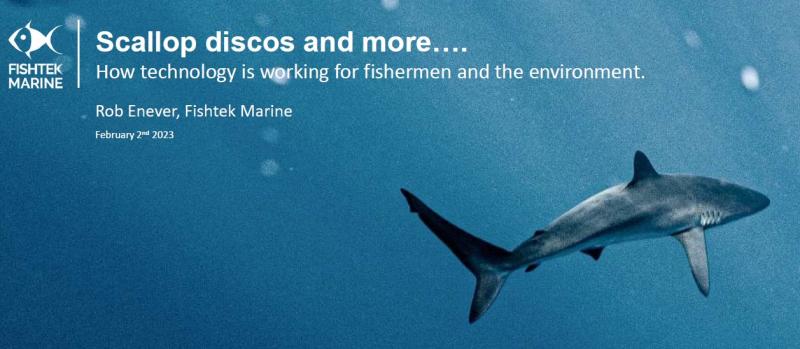
……but not just fishing trawlers.
Rob Enever of Fishtek marine gave Coastwise members a hugely encouraging account of how Fishtek is designing and producing technology to combat and reduce the vast amount of distressing bycatch that trawling and long-line fishing incurs round the world.
Rob started life as a marine biology graduate, fisheries inspector, then work for CEFAS and Natural England including a PhD, before moving into the private sector to try and reduce the adverse effects of fishing. These can include large-scale destruction of uneconomic fish, cetaceans, sharks, turtles and seabirds.
Fishtek Marine is a small and innovative company located in S Devon that designs and manufactures a wide range of devices thatfisherman can use to reduce bycatch. The environment is very adverse – salt water, rough handling and the need for low cost in a low-margin industry.
One of the most eye-catching fields that Fishtek has worked on is scallop fishing, where the traditional otter-board process is hugely damaging to the seabed. Fishtek found that light in crab and lobster pots results in significant catches of scallops in theese pots. They've researched the type of light, batteries and pot design, tested in a number of locations round the coast, and the scallops are a big economic boost for these fishermen.
Other inventions include SharkGuard, which is a device producing a small electric charge attached to hooks on long lines. The charge very effectively stops sharks taking the baited hooks. Also for long lines is a pressure-operated device for hooks that encases the hook and only opens when it has sunk about 20m beolow the surface, beyond the diving range of seabirds.
Netlight is an attachment for monofilament nets that allows turtles and tuna to ses and avoid the nets. However, the low-income fisherment who use these nets in the poorer parts of the world need support to use such devices.
Overall, a very encouraging initiative by an innovative small company that deserves the support of worldwide trade ecological organisations to reduce the damge done by the fishing industry to the natural marine world.
Rob didn't wish to be recorded, and the file of slides for the talk is quite large. If you would like to see the slides, email [email protected], and the file can be sent to you by WeTransfer.

